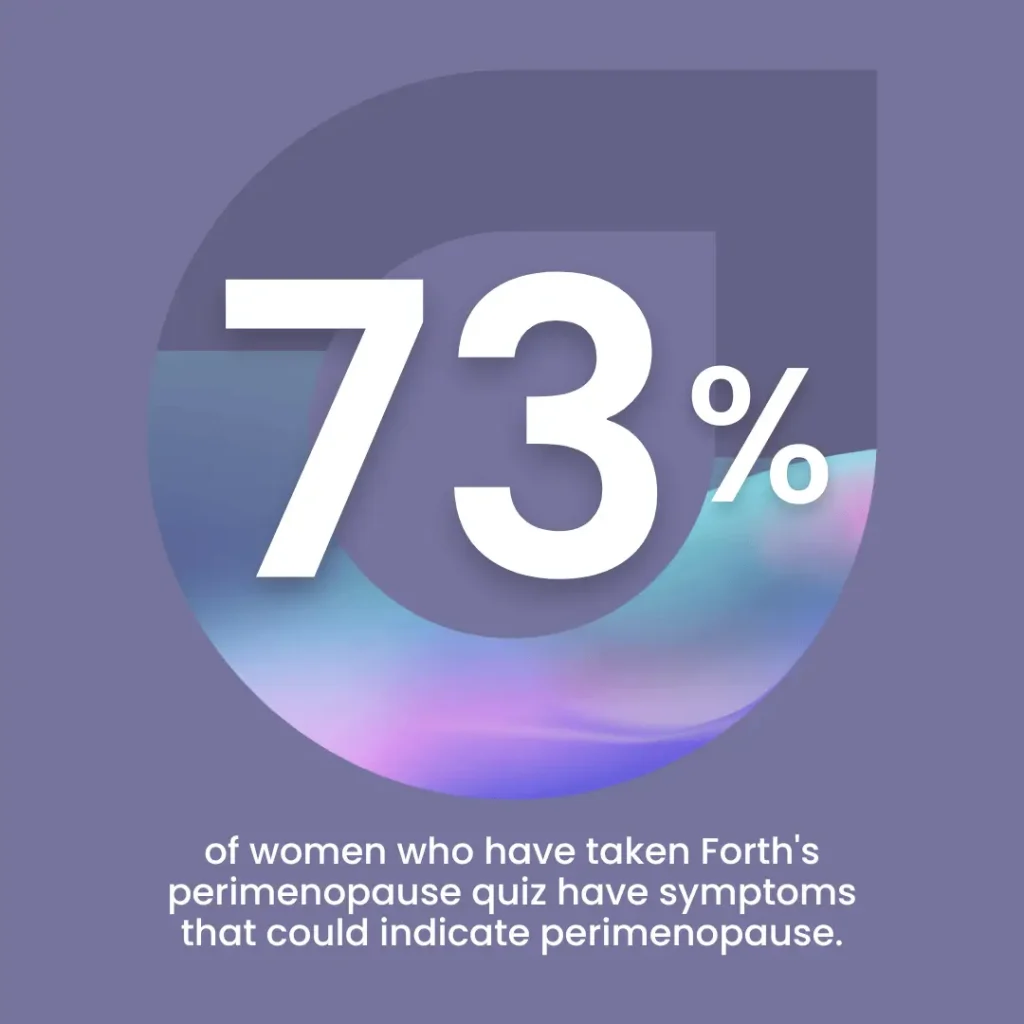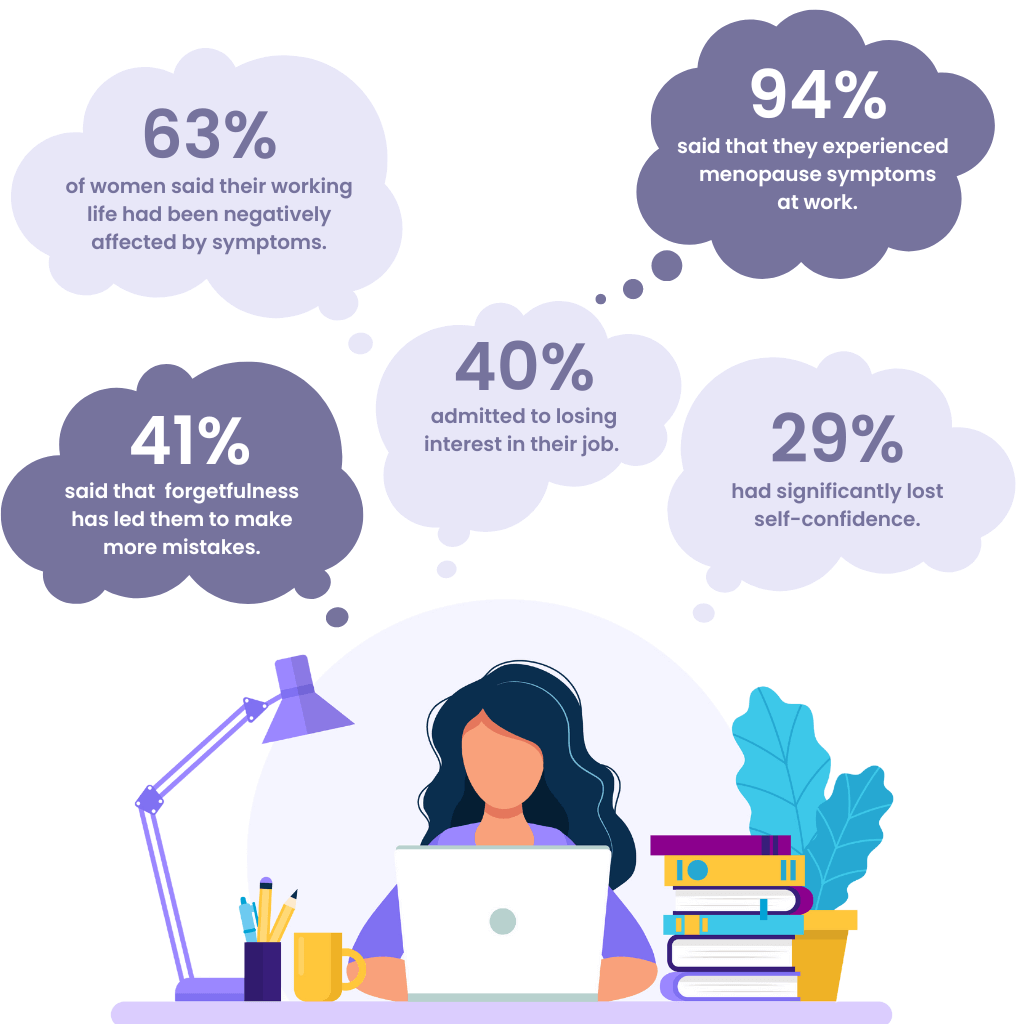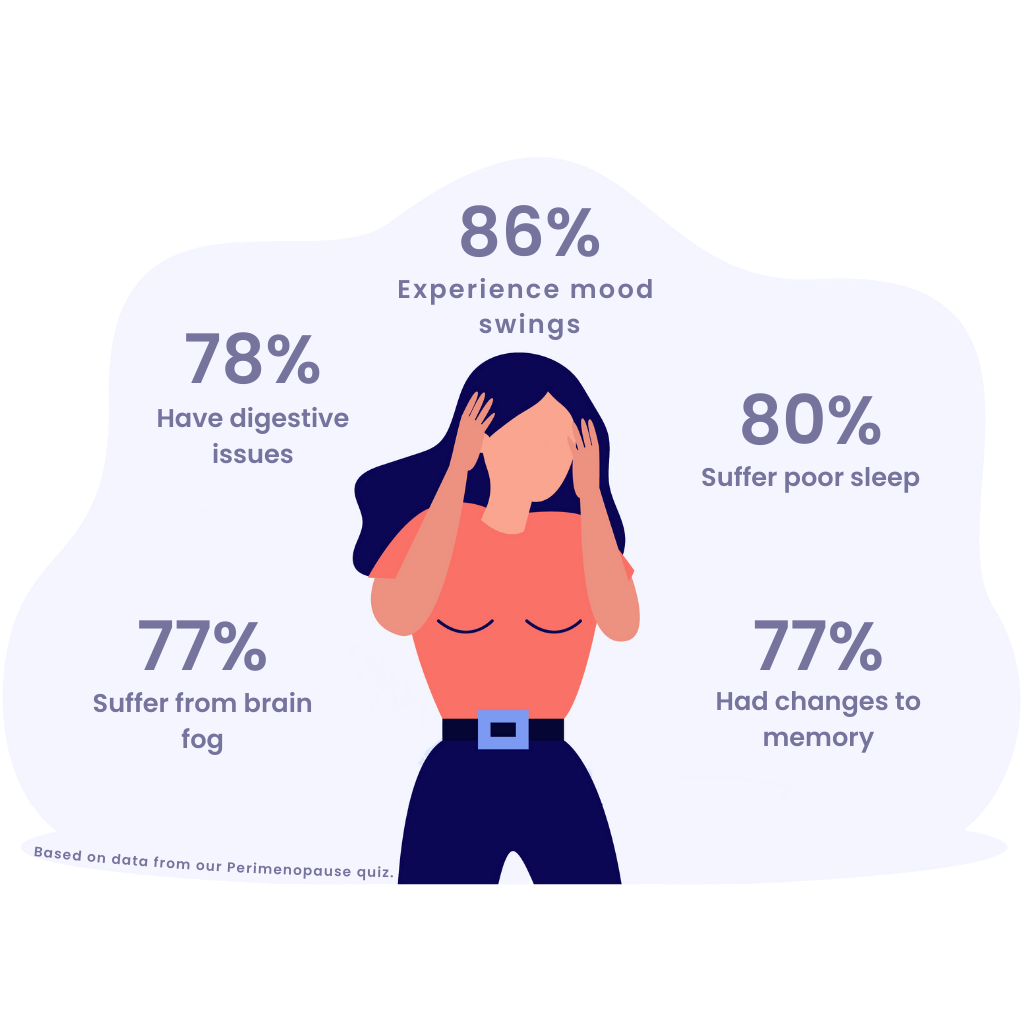Build your own
Build your own test that's specific to your health needs, choosing from our wide range of Biomarkers.
Choose from 30+ markers
11 mins read
Living with Perimenopause & Menopause: How to Manage your Symptoms
Author: Forth
September 26, 2022

- Coping with perimenopause symptoms
- Managing weight in menopause
- Top 5 Foods to Eat
- What food should I avoid?
It can be hard to know what is going on in your body during the transition to menopause (known as perimenopause) and beyond in to post-menopause. The physical and mental symptoms caused by the perimenopause can leave women feeling unable to cope with their day to day lives; affecting their work, homelife and confidence. This guide aims to inform women about the transition through menopause and help them prepare for the symptoms and changes that they might experience.
Menopause affects every woman in different ways, with some experiencing mild symptoms, and others much more severe. 73% of women who have taken Forth’s perimenopause quiz have symptoms that could indicate perimenopause and a study by Nuffield Health Group found that 1 in 4 women are struggling to cope with life due to symptoms of perimenopause. [1]

It is evident that more work needs to be done to inform women of the changes that will take place as they approach menopause:
- 45% of women failed to recognise they could be experiencing perimenopause symptoms
- 42% thought they were too young to be experiencing perimenopausal symptoms, putting it down to stress
- 67% of women felt there was little help and support for those going through the perimenopause and menopause
- 25% who visited their GP said the possibility of the symptoms being related to perimenopause wasn’t mentioned
In our own study into menopause in the workplace, we found:
- 63% of women said their working life had been negatively affected in some way by their symptoms
- 41% said that their poor concentration or forgetfulness has led them to make more mistakes
- 29% had significantly lost self-confidence
- 40% admitted to losing interest in their job
- 94% said that they experience menopause symptoms at work.

Coping with perimenopause symptoms
Perimenopause has over 34 different symptoms, ranging from hot flushes and irregular periods to mood changes and anxiety. Data from Forth’s perimenopause quiz suggested that some of the most common symptoms experienced are mood changes (86%), poor sleep (80%), and digestive issues (78%). We take a look at how you can cope with perimenopause symptoms.

Managing weight in menopause
The best place to start when looking to address perimenopause symptoms is with lifestyle changes, such as exercise and diet. Research has found that a woman’s resting energy expenditure (the number of calories she burns during rest) declines during and after menopause, which can in turn make it difficult to lose weight. Below we explore ways to support long-term health and manage weight in perimenopause.
Diet
Are calorie deficit effective in perimenopause?
A calorie deficit is considered one of the most effective ways to lose weight. This is when you consume less calories than you burn, which can be achieved by tracking the amount of calories you are consuming and sticking to a set number of calories per day or week. However, this might not be as affective for menopausal women. Studies have shown that while very low calorie diets may result in short-term weight loss, it can reduce lean muscle mass and result in a drop in metabolic rate, making it hard to keep the weight off in the long run.
If you are considering a calorie deficient to lose weight in menopause, it’s important to ensure you are consuming enough calories to fuel your body and are achieving a good balanced diet to support your body through the tricky transition.
Top 5 Foods to Eat
Having a balanced diet full of vitamins and minerals is the best way to ensure you are looking after your body and long term health during menopause. Foods that are great for achieving this are:
- Lean meats – chicken and turkey are full of protein and will make you feel full for longer, helping you to avoid snacking between meals.
- Oily fish – fish like salmon or mackerel contain omega 3 and vitamin D which supports a healthy heart, flexible joints and protects against osteoporosis.
- Leafy greens – contains iron which helps with the production of healthy, functioning red blood cells and energy production.
- Whole grains – barley and brown rice contain magnesium which helps maintain strong bones and helps with blood pressure regulation.
- Greek yogurt – contains calcium which helps with gut health and aids strong bones and teeth.
- Nuts – peanuts and almonds contain both magnesium and iron, and are great for supporting energy production and neurological function.

What food should I avoid?
Too much of the below can impact your health and worsen your symptoms, like digestive issues and headaches:
- Sugary snacks like cakes and chocolate – changing oestrogen and progesterone levels affect insulin levels, causing blood sugar level fluctuations. This doesn’t mean cutting back on all treats, but having a healthy balance is key.
- Alcohol – is a toxin and can cause damage to our bodies if consumed excessively. In menopausal women, it has been known to exacerbate symptoms, such as hot flushes. This is because alcohol causes dilation of blood vessels, causing increased blood flow.[2]
- Caffeinated drinks – could exacerbate symptoms such as hot flushes and digestive issues, especially if you are already suffering from conditions such as Irritable Bowel Syndrome (IBS.) Try switching one of your daily coffees to decaffeinated drinks, or herbal teas.[3]
- Processed foods – foods like microwaveable meals often contain high salt levels. Too much sodium in the diet is linked to high blood pressure. Changes in hormones during menopause can make blood pressure more sensitive to salt in the diet, so it’s important to monitor your intake.[4]
Planning exercise in menopause
Consistent exercise is important at any stage in life, but in perimenopause it can help keep weight off as hormones fluctuate, and can help with the management of symptoms. The types of exercises that are good during the menopause are those that focus on bone and muscle strength, flexibility, and cardio. It’s important to keep up regular exercise as you get older and tailor your routine to suit your needs.
What are the benefits of exercise?
Not only can exercise help combat weight gain, it can help improve your long term health by reducing your risk of conditions such as heart disease, diabetes, osteoporosis, and certain cancers. Exercise also increases the level of endorphins, helping to reduce stress and make you feel happier.
Strength training is just as important to incorporate in your exercise routine as cardio. It is highly recommended for women in menopause to do strength training to maintain muscle mass, as this naturally declines as women age. A decline in muscle mass can contribute to a lower metabolism, and in turn can make it a tougher challenge to lose weight.
4 Types of Exercise for Menopause
- Resistance exercise – also known as weight training, is good for maintaining body composition, muscle strength and bone health during menopause.
- Yoga – not only is it a weight-bearing exercise so good for your bones, but it helps keep your muscles strong and flexible. It can also help to reduce tension and stress.
- Swimming – works all the major muscle groups in the body. It’s low impact, so is a much gentler way to exercise.
- Walking – is a great way to get fit without having the same level of impact as running. Brisk walk is good for getting your heart and lungs working. In addition, walking in nature has the added benefit of improving your mental wellbeing.
Resting During Menopause
It’s equally important to ensure you are getting enough rest and ensuring you have time to relax. Hormone changes and mental health issues, such as anxiety, can increase levels of the stress hormone cortisol, so it’s important that you give your mind and body sufficient time to rest.
How to Improve Sleep During Menopause
A good night’s sleep of around 7 to 8 hours helps our mind and body repair, but we know sleep can be a challenge during menopause due to the symptoms such as night sweats. 80% of women who did Forth’s perimenopause quiz suffer from poor sleep.
Sleep Hygiene
Practising good sleep hygiene can help you sleep better. Sleep hygiene is the term used to describe a number of science-backed practices that are carried out during the day and just before bed that help to create the exact conditions needed to sleep well. These include:
- Sleeping at regular times – going to bed and waking up at the same time every day can help regulate your sleeping pattern and balance your body’s natural body clock.
- Reducing screen time – stopping any activity on your mobile phone, laptop or tablet an hour before bed to ensure your brain is not stimulated by blue light.
- Meditation – if you often find yourself struggling to sleep, meditation can help calm your mind if you are feeling anxious. Apps like Calm and Headspace provide some great guided bedtime meditations.
How Does Menopause Affect Mental Health?
Feeling down, sad, and anxious are very common symptoms of menopause and perimenopause. 86% of women who did Forth’s perimenopause quiz said they were experiencing mood changes, such as increased anxiety and bursts of anger.
The hormonal changes during menopause affect numerous tissues and biological systems including those in the brain.[5] Female hormones, oestradiol and progesterone, are neurotransmitters (chemical messengers to the brain), so changing levels can be linked with psychological issues during menopause. Moreover, symptoms of perimenopause, such as night sweats and poor sleep, can contribute to low mood and increased anxiety.
4 Ways You Can Support Your Mental Wellbeing During Menopause
There are a number of ways to help support your mental health during menopause including:
- Meditation – is a good way to switch off from the day and calm your mind down. It will help ensure you put some time aside each week for yourself, your own selfcare, and mind.
- Mindfulness – The changes women go through during the menopause can make them feel overwhelmed and stressed. Mindfulness helps by making you focus on the present by focusing on your breathing and sensations in your body and can give you time away from your worries.
- Exercise – As mentioned before, exercise can be a great way to support your mental health and boost your mood. This is because walking increases blood flow and blood circulation to the brain and body, helping to reduce cortisol levels, and feelings of stress.
Treatments and medication
There are various treatment options available that can help ease mental symptoms of menopause. It’s important to define if you are experiencing mood changes and low mood as a result of menopause, or if you could be suffering from depression. Your GP can discuss the following services with you:
- Hormone replacement therapy (HRT) – can help reduce psychological symptoms by replacing hormones oestrogen and progesterone.
- Counselling or Cognitive Behavioural Therapy (CBT) – can help you process and understand your feelings.
- Antidepressants – such as selective serotonin reuptake inhibitors (SSRIs) can be prescribed by your GP. NICE guidelines advice against antidepressants for menopause treatment unless you have been diagnosed with depression. However, if you find yourself experiencing constant low moods which makes day to day life debilitating, you should discuss this with your GP.
Fertility
Trying for a baby
As you transition through to menopause, your periods will begin to become more irregular and ovulation will become less certain. This can make it more difficult to become pregnant, but does not mean there is no chance of pregnancy. It is still possible to become pregnant during the perimenopause. However with a drop in progesterone, the key fertility hormone, it is more difficult to conceive and maintain a pregnancy.
“With reduced ovarian responsiveness comes sporadic ovulation and hence reduced fertility.” – Dr Nicky Keay, Endocrinology Expert, BA, MA (CANTAB), MB, BCHIR, MRCP

Contraception
If you are not planning on having children you should continue to use a contraceptive until you reach menopause. This can vary from woman to woman, but is usually around her 50s. MyFORM can confirm if you are perimenopausal and can give you a good indication into how far through menopause you are. It is important to note you cannot take hormonal contraception alongside HRT.
HRT
Hormone Replacement Therapy (HRT) replaces the key hormones you lose during the menopause, oestrogen and progesterone. It helps stabilise your hormone levels, and in doing so, relieves the symptoms experienced during perimenopause.
Treatments come in different preparations depending on the type of treatment prescribed. The most common forms are transdermal preparations in the form of gels and skin patches and orally in the form of tablets.
Menopause Supplements
If you are not keen on taking HRT and want to try supplements, there are a few on the market that may help alleviate the symptoms of perimenopause:
- Black Cohosh – helps relieve hot flushes/night sweats and improve mood.
- St John’s Wort – to help with low mood and mild anxiety (do not take if you are already taking an SSRI or other drug to help with anxiety or depression, check with your GP first).
- Isoflavone – this supplement helps with the side effects of dropping oestrogen levels and has the potential to act like HRT.
- Rhodiola – this herbal medicine has been used for relief from symptoms such as fatigue, exhaustion, and mild anxiety.
Summary
The transition through to menopause can be an incredibly challenging time for women due to fluctuating hormone levels that result in physical and psychological symptoms. By having a good understanding of the changes taking place during menopause and the symptoms that may occur, it can help women feel more in control and better prepared to manage their symptoms.

“Menopause is a normal physiological process in a woman’s life. Understanding and being prepared for this phase in your life will mean you are in a good position to meet the challenges of this life stage and to maintain your quality of life.” Dr Nicky Keay, Endocrinology Expert, BA, MA (CANTAB), MB, BCHIR, MRCP

MyFORM® Female Hormone Mapping
Our ground-breaking hormone mapping blood test means you can finally understand your hormones across your entire menstrual cycle, helping you to better understand your body and improve your wellbeing.
Multi-day test
MyFORM® Female Hormone Mapping

Check fertility, hormone imbalance or hormone-related conditions with our ground-breaking hormone mapping test.
Female hormone mapping
Tracked 24 delivery & return
Two test kit
£129
3 interest-free payments of £43
- Health scores calculated
Close
This article was written by Forth
Get 10% off your first test
Sign up to offers and all the latest information on managing your own health and save 10% on your first test.



